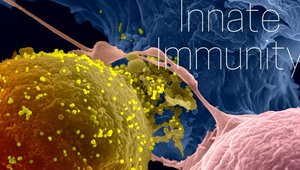Jean-Marc Cavaillon
Jean-Marc Cavaillon got his Doctorat-ès-Sciences in 1980 (University of Paris VI).

After completing his post-doctoral fellowship at the University of Toronto, he joined the Institut Pasteur (Paris). He is now professor and Head of the research Unit "Cytokines & Inflammation".
At Institut Pasteur, he has been Director of the "General Immunology Course" (1997-2002), Scientific Director of the "Euroconferences" (2002-2006), and director of the Department "Infection and Epidemiology" (2006-2009). He has chaired the committee of evaluation of the scientists of the Institut (2012-2015).
Jean-Marc Cavaillon’s researches focus on inflammation and innate immunity, particularly on cytokines, bacterial endotoxins and other Toll-like receptors agonists, endotoxin tolerance, activation of monocytes/macrophages, neutrophils and more recently NK cells. He has contributed to define the altered immune status in sepsis patients and in patients with systemic inflammatory response syndrome (SIRS), and contributed to define the reprogramming of circulating leukocytes of sepsis and SIRS patients.
Jean-Marc Cavaillon a reçu son doctorat-ès-Sciences en 1980 (Université Paris VI). Après avoir terminé sa formation post-doctorale à l’Université de Toronto, il a rejoint l’Institut Pasteur (Paris). Il est actuellement professeur et dirige l’unité de recherche « Cytokines et Inflammation ».
A l’Institut Pasteur, il a été directeur du « Cours d’Immunologie Générale » (1997-2002), directeur scientifique des « Euroconférences » (2006-2009), et directeur du département « Infection et Epidémiologie » (2006-2009). Il a présidé le comité d’évaluation des scientifiques de l’institut (2012-2015).
Jean-Marc Cavaillon s’intéresse principalement à l’inflammation et l’immunité innée, et plus particulièrement aux cytokines, aux endotoxines bactériennes, aux récepteurs de type Toll, à la tolérance aux endotoxines, à l’activation des monocytes/macrophages, neutrophiles et des cellules NK. Il a permis de mieux comprendre les modifications du statut immunitaire chez les patients atteints de sepsis et chez les patients présentant un syndrome de réponse inflammatoire systémique (SRIS) et a déchiffré la reprogrammation des leucocytes circulants chez les patients atteints de sepsis et de SRIS.
Cours
 CatégorieCertifiant
CatégorieCertifiant

